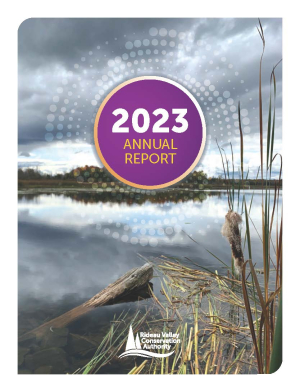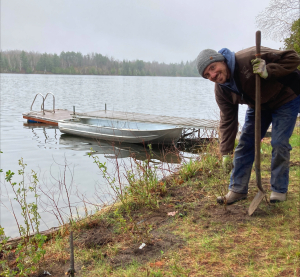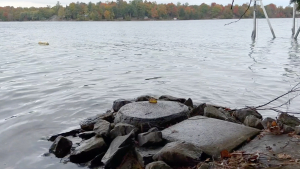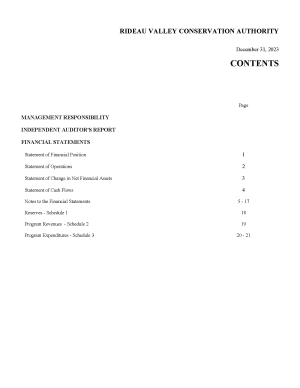Super User
RIDEAU VALLEY, June 3, 2024 – In many ways, 2023 was the Year of the Bridge for the Rideau Valley Conservation Authority.
In its recently released annual report, it’s clear that 2023 was an extremely busy and productive year for all departments as they built bridges both real and figurative across the watershed.
In the most literal sense, staff completed the construction of two much-needed accessible pedestrian bridges at Baxter Conservation Area and Chapman Mills Conservation Areas, which will benefit the community for decades to come.
But staff also spent time connecting with valued partners, expanding their knowledge of the watershed and ensuring the RVCA’s services remain relevant, valuable and accessible to everyone who calls the Rideau Valley home.
Throughout 2023, RVCA staff:
- Welcomed more than 8,100 students to outdoor education programs at Baxter and Foley Mountain conservation areas;
- Planted 214,030 trees in partnership with private landowners, with $484,000 in external grant support;
- Funded 211 clean water projects on rural and farm properties, providing $642,935 in landowner grants;
- Naturalized 1,719 metres of shoreline with more than 9,300 native plants, including more than 1,000 planted at Last Duel Park in Perth;
- Sampled 39 lakes and 119 stream sites for surface water quality;
- Surveyed 361 stream sections to assess aquatic habitat conditions;
- Completed a once-in-a-decade Watershed Conditions Report to bridge the gap between data collection and scientific analysis;
- Began data collection for new flood mapping on several upper watershed lakes and initiated the development of a new hydrologic model of the watershed;
- Accepted 199 hectares of conservation land donations from local landowners;
- Processed 319 Section 28 permit applications (with 98% approved or on hold), issuing decisions for all but 2 within provincial timelines;
- Reviewed 1,952 planning applications, providing natural hazard comments to municipalities;
- Processed 944 septic permit applications (usually within half the provincial timeline) and re-inspected 651 septic systems around lakes.
“I am so proud of our staff as they continue to provide quality conservation services to our watershed municipalities, residents and partners,” said RVCA General Manager Sommer Casgrain-Robertson. “We are committed to bringing value and expertise to all of our partners, and 2023 was a great example of that.”
To read the full report online visitwww.rvca.ca or contact the front desk at 613-692-3571 to request a hard copy.
RVCA is one of Ontario’s 36 Conservation Authorities responsible for furthering the conservation, restoration, development and management of natural resources in the watershed. Through the provincial Conservation Authorities Act, the RVCA is responsible for protecting people and property from natural hazards like flooding and erosion and managing natural resources within the Rideau Valley.
Learn more at www.rvca.ca.
-30-
RIDEAU VALLEY, May 28, 2024 – With this year’s spring planting behind us, now’s the time to secure your spot for the 2025 season. Whether you want to plant trees on your idle or marginal land or plant shrubs to naturalize your shoreline, RVCA is now booking site visits to get the process started.
The Rideau Valley Conservation Authority (RVCA) offers generous grants to help landowners protect and enhance the watershed’s natural resources: tree planting is subsidized to between $0.15 and $0.40 per tree, while shoreline naturalization costs may be covered up to 90%.
Tree planting and shoreline naturalization projects support a thriving watershed by slowing down and filtering stormwater runoff, reducing erosion, mitigating floods and storing carbon to reduce the impacts of climate change. And there are benefits for the landowners, too: depending on the project, they may see reduced property maintenance, increased privacy, lower heating and cooling costs, fewer nuisance geese and increased property value.
“It’s really a win-win for everyone,” said RVCA Forestry Manager Ian Cochrane. “These projects become a legacy that landowners can gift to the next generation in the form of a clean environment, thriving biodiversity and a beautiful natural place to visit.”
The RVCA plants more than 200,000 native trees across the Mississippi and Rideau Valley watersheds every year, and approximately 10,000 native shoreline trees, shrubs and flowers around Rideau Valley lakes and rivers.
Site visits ensure eligibility and will allow staff to craft a custom planting plan to suit your needs. Once your project is booked, staff will order the plants and work towards the 2025 spring planting season. Staff will also return for several years to ensure the survival of your project and refill where necessary.
To book a tree planting site visit contact Ian Cochrane at . To book a shoreline naturalization site visit contact Meaghan McDonald at .
Tree Planting Eligibility:
Our large-scale tree planting program is available to all landowners in the Rideau Valley and Mississippi Valley watersheds, provided they meet minimum planting requirements. Outside the City of Ottawa, landowners must have at least 1.25 acres of suitable land and must order at least 1,000 trees. Within the City of Ottawa’s portion of the MVCA and RVCA watersheds, tree planting minimums have been lowered to 500 trees for 2025. This means Ottawa properties with 0.62 acres (0.25 hectares) of suitable land or more may now be eligible to participate.
Shoreline Naturalization Eligibility:
All lake- and river-front landowners within the Rideau Valley watershed are eligible for subsidized shoreline naturalization along the “ribbon of life” where land meets water. Staff work with landowners to create a custom plan that preserves their water access and views while adding a natural buffer along the shore. Landowners can choose to do the planting themselves or have RVCA staff assist.
Learn more about our stewardship programs at www.rvca.ca/stewardship-grants.
-30-
Public Consultation - Wetland Mapping Update
Consultation Paused on Updated Wetland Mapping
Please be advised that the RVCA, SNC and RRCA are pausing consultation on updated wetland mapping. We appreciate the feedback and comments we have received to-date and support direction we received from the Ministry of Natural Resources giving us time to work on a local approach.
Over the coming months, the conservation authorities will work with ministry staff, municipalities and stakeholders to develop this local approach. Please note that this means that open houses and one-on-one meetings with property owners will be paused and rescheduled at a later date.
- CANCELLED – Open House on June 26 (RVCA Administrative Office, Manotick)
- CANCELLED – Open House on June 27 (SNC Administrative Office, Finch)
If you have any questions, please contact RVCA staff at 613-692-3571 or 1-800-267-3504 or by email at .
Background:
On April 1, 2024, the Government of Ontario replaced individual Conservation Authority Regulations under Section 28 of the Conservation Authorities Act, with Ontario Regulation 41/24: Prohibited Activities, Exemptions and Permits. The goal of this legislative change was to streamline approvals and establish a standardized approach to the regulation of natural hazards, wetlands, watercourses and shorelines across Ontario.
The RVCA has updated its development policies to comply with the new regulation and be more user-friendly by:
- Improving transparency of the permit process.
- Consolidating all applicable policies into one document.
- Maintaining a consistent standard for review and thresholds for approvals.
- Enhancing the functionality of the document as a reference tool and technical guide.
- Increasing responsiveness of the document by annual updating to address emerging trends, legislative changes, and innovations in natural hazard protection.
The RVCA’s Draft Development Activity Policies and Procedures: Policies and Procedures for Development Activity permit applications made under Section 28.1 of the Conservation Authorities Act is now available for public consultation.
MISSISSIPPI-RIDEAU, May 16, 2024 – Just in time for cottage season, the Mississippi-Rideau Source Protection Region (MRSPR) has released a series of short educational videos about keeping your drinking water safe when drawing directly from a lake or river.
Drinking surface water is not uncommon on waterfront properties, but comes with unique risks, including increased potential for harmful algal blooms, pathogens and chemical contaminants to impact drinking water safety.
The MRSPR’s new four-part video series addresses these issues, discussing the pros and cons of available at-home water treatment options and even taking viewers on a tour of an Otter Lake resident’s water treatment setup.
“Drinking water safety is paramount for lake residents, but it can be difficult to find reliable information to ensure you’re taking the right actions to keep your family safe,” said Mississippi-Rideau Source Protection Program Manager Marika Livingston. “We hope these videos can shed some light on the risks and offer easy solutions to help residents manage them.”
A recent study of private drinking water supplies on seven major lakes in the Upper and Middle Rideau Valley watershed found that approximately 1,000 residential properties draw water directly from their lake. About one third of these properties reported they are drinking that surface water.
The study recommended more public education for users of private surface water and groundwater systems, with a focus on the rising issue of harmful algae blooms on lakes and how to choose an appropriate private water treatment system for your property to ensure safe drinking water. This may include a combination of filters, chemical disinfectants, UV light disinfection, water softening or reverse osmosis. Each system comes with its own benefits and limitations, including the little-known fact that UV light disinfection is not effective for removing the toxic bacteria present during a harmful algal bloom (sometimes called a blue-green algae bloom).
The video series can be found here: https://youtube.com/playlist?list=PLUaIqdqjZV3ejIskX-heBA8dcfFPAht3v&si=hlhq4OHZ8y_F1SUK
More information about drinking water protection in general – including how residents can help keep contaminants out of their drinking water sources – can be found at www.mrsourcewater.ca.
-30-
More to explore:
The MRSPR, in partnership with local conservation authorities and neighbouring source protection regions, helps produce the Drinking Water Wise webinar series focused on informing residents about drinking water issues. Find recordings of past webinars and sign up on the mailing list to hear about upcoming dates here: https://www.quinteconservation.ca/en/watershed-management/drinking-water-wise-webinars.aspx.
2023 RVCA Financial Statement
Become a citizen scientist with City Stream Watch!
OTTAWA, May 13, 2024 – If you’re fascinated by the natural world, love spending time outside or simply want an excuse to splash around in your local creek, now’s your chance.
The RVCA’s City Stream Watch program will host a volunteer orientation day on May 25 for anyone interested in helping with its stream assessments, which carefully survey the full length of four Ottawa creeks each summer. This year’s candidates are Graham Creek near Bayshore Mall, Brassils Creek near Burritts Rapids, McEwan Creek in Greenboro and Greens Creek in Beacon Hill.
Survey volunteers can sign up for their preferred shifts on weekday mornings, afternoons or evenings, as well as Saturdays, with survey work beginning in June. Volunteers will help staff sample water chemistry for the presence of metals, nutrients and contaminants, and also record water temperature.
They’ll also help survey the stream's morphology, habitat and shoreline conditions, and note the presence of any native or invasive species.
“Urban creeks are especially vulnerable to pollution and invasive species thanks to their proximity to roads and developments, which can send a lot of contaminated runoff into our water,” said RVCA’s Acting City Stream Watch co-ordinator Eric Guitard. “By surveying these streams we can track the impacts and direct our resources toward areas that need some attention.”
This could include targeted invasive species removals, shoreline restoration or even recommendations for better stormwater management on nearby public properties.
Volunteers are the backbone of the program, which is administered by Ottawa’s three conservation authorities in the Rideau Valley, Mississippi Valley and South Nation watersheds with support from several community and non-profit organizations.
No experience is necessary, as the RVCA will host a volunteer orientation training day between 10 a.m. and 12 noon on Saturday, May 25 at the mouth of Sawmill Creek off of Riverside Drive for interested recruits. Training will also be provided on the job.
“It’s an incredible way to get involved,” said Guitard. “You make a meaningful difference to your local environment while spending the day learning outdoors. It doesn’t get much better than that.”
Volunteers are also needed for regular public clean-ups and invasive species removals, which usually take place on Saturday mornings across the city between now and October.
To join the volunteer mailing list or register for the orientation day, email . Visit https://www.rvca.ca/volunteer/city-stream-watch to learn more.
-30-
Book it to Baxter to visit new Storybook Trail
MANOTICK, May 2, 2024 – Forests are full of stories, and now Baxter Conservation Area has added another in the form of a permanent Storybook Trail.
Thanks to a generous grant from the TD Friends of the Environment Foundation (TD FEF), a series of displays now dot the popular and accessible Fiddlehead Trail, beginning at the Interpretive Centre. Each case offers a single page of the featured story, allowing families to read together as they move along the trail. Fun activities and challenges that relate to the story also encourage kids to dive deeper into the natural world around them.
“This is such a wonderful addition to our trail network,” said Baxter Site Supervisor Andrea Wood. “Any way we can engage families while getting them outside in nature is a huge win for everyone.”
The Storybook Trail’s first featured book is A Log’s Life by Wendy Pfeffer, which follows the fate of an oak tree that has fallen in a storm. As the giant log slowly returns to the soil, new life springs forth in its place.
“The book ties in perfectly with what kids will see happening in the forest around them as they walk the trails,” Wood said. “It’s another way to spark their curiosity about the natural world.”
The Rideau Valley Conservation Foundation helped facilitate the TD FEF grant after a temporary version of the Storybook Trail was installed during the COVID-19 pandemic to safely engage families on site. It proved extremely popular.
“We are so thankful to TD Friends of the Environment for their ongoing support of our outdoor education programs,” said Foundation Director Diane Downey. “Kids are the future, and our partners are helping us invest in them.”
The Storybook Trail’s featured book will change with the seasons. The trail is open dawn to dusk year-round. Parking is $8 per day or $55 for an annual pass.
Learn more about Baxter Conservation Area and plan your visit: https://www.rvca.ca/conservation-areas/fee-required/baxter












